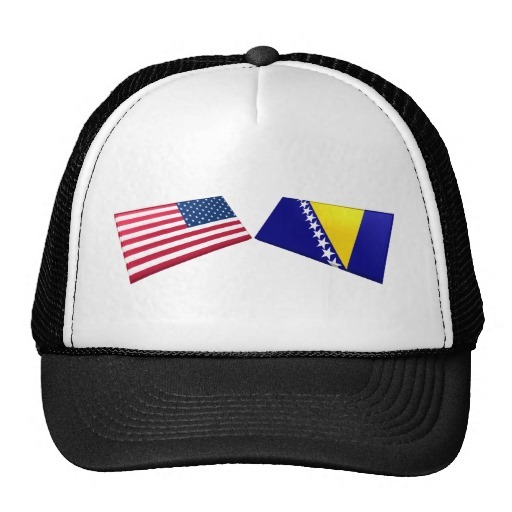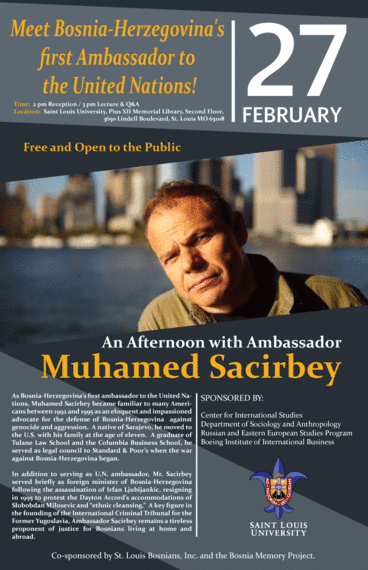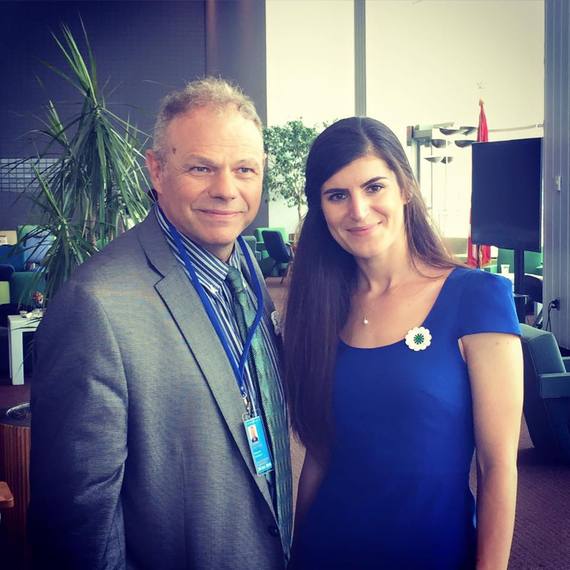Early July still brings a bittersweet week for Bosnian-Americans. They are reminded by the Srebrenica genocide commemoration why so many had to flee Bosnia and Herzegovina and why they/we are so fortunate to have been welcomed in America. The Declaration of Independence, US Constitution and Bill of Rights highlight the reasons behind America's prosperity as well as diversity. July 4th contrasts with July 11th, the day that the Srebrenica genocide began, because of the manufactured intolerance that resulted in mass murder and ethnic cleansing, and the failures of political leaders in BiH but also of those from Washington and Europe to help deliver change from the recent chasm.
While Srebrenica remains more a living monument to the fruits of genocide, overwhelmingly Bosnian Americans are grateful for America's blessings, inclusiveness as well as opportunities. For many, their greatest wish is to see their homes of origin restored to the values of diversity that BiH and America historically share. BiH did not lack a tradition of diversity and tolerance. But coming out of an age of less than democratic communism, it became more susceptible to the appeal of ethnic, religious and political chauvinism, and the manufactured fear that was used as weapon against the other. Of course, it is a similar challenge that many EU countries and the United States faced but BiH did not have the benefit of the US Constitution and the Declaration of Independence that have helped steer the political course despite the trying storms of slavery, extermination of Native Americans and a brutal Civil War. The storms still persist even today, from Ferguson and the #CharlestonShooting to xenophobia and income inequality; but the political compass symbolized by July 4th is constant.
Pattern of Concealing the Crime and Minimizing the Genocide
So is the reminder of July 11th for most Bosnian/Herzegovinian Americans. Most did not originate from Srebrenica, but that genocide represents the systematic murder and ethic cleansing that so many sought to escape from the Krajina region to eastern BiH. Prijedor was the witness of a particularly brutal campaign of genocide, where today mass graves of children, women and men are being still unearthed, some under soccer fields meant to cover up the fact that on one day whole neighborhoods were emptied into the street and their young and old citizens exterminated. While Srebrenica was a UN "safe area" and NATO "protected zone" betrayed, the history of efforts to minimize, even conceal, the systematic effort at genocide throughout BiH was already evident, as in this report and my statement to the "Washington Post" (three years before the Srebrenica killings), August 6, 1992: "Some within the UN hierarchy along with members of the UN Security Council P-5 concealed reports from the ground."
We believe {detainees there} are only a tip of the iceberg involving the concerted action of local Serb authorities in BH {Bosnia-Hercegovina} trying to establish a Serbian Republic of BH, free of Muslims'... The information should have been directed through the proper channels to the Security Council, asking for an urgent review of these matters and appropriate treatment. This has not happened. It has taken the newspaper reporters and media reports of the camps to jolt the international community to move forward.' Sacirbey added that the situation was 'unfortunate in view of the loss of lives and other suffering caused by the delay. On Friday, Sacirbey distributed a list of 105 sites that he charged were detention camps and prisons for non-Serbs in Bosnia and the new Serb-controlled Yugoslav state -- a union of Serbia and its seaboard satellite, Montenegro.
Read full text of "Washington Post": " UN Knew of Serb Camps..."
Recharging My Batteries as an American and Bosnian
Overwhelmingly, most Bosnian-Americans see America in its July 4th context as well as home despite the betrayals and efforts of some then and now to minimize the genocide of and meaning of July 11th. On a recent visit at the invitation of the Saint Louis Bosnian-American community, St. Louis Bosnians (Akif Cogo), Saint Louis University (Prof. Patrick McCarthy), BiH concentration camp survivors (Amir Karadzic) and the local Bosnian Islamic Center, the evidence of success, integration, assimilation and simultaneously retaining one's cultural and religious roots again exceeded my expectations. The most inspiring surprise came from my visit and talk to the Bosnian Studies class at Afton High School. Many of the students interested were not of Bosnian origin. Many of today's younger generations have come to understand that the US is not separate from the world and that being a global citizen is consistent with our American values and shared vision of an increasingly intertwined future, whether we like it or not. A few of the students of Bosnian background also came from inter-racial marriage, at a time when Saint Louis was being reminded of its legacy as a slave state and the continuing remnants of intolerance which came to a head in the suburb of Ferguson. Most rewarding to me was that I could exchange with teens ideas and views on everything from the United Nations to the International Criminal Court to the role of diplomat-artists - it was not a lecture but a learning experience for all of us. besides recharging my batteries as an American and Bosnian.
The first Bosnian/Herzegovinian refugees started coming to Saint Louis more by design of US officials and agencies who saw the city losing its population, economic base and cultural character. Now Saint Louis is probably the largest metropolis of Bosnians/Herzegovinians outside BiH, and certainly in North America. (From Chicago to Jacksonville to Toronto to Phoenix to Seattle to Grand Rapids to Syracuse/Utica major Bosnian American populations impact the business and politics of North America). Most took jobs that many others would not, from cleaning to truck driving. Some did manage to establish for themselves a creative space as artists or university lecturers. Others did feel needs as doctors and nurses in America's hospitals, (as my cousin Dr. Mirha Avdagic). Grbic Restaurant in Saint Louis was one of the first examples of small business enterprise, and now Bosnian Americans own/operate everything from logistics and trucking to construction and high-tech development. Many Bosnian Americans have served in the US military, recognized for courage and commitment to duty, while others are part of America's law enforcement. Now, many multi-generation established Americans have also come to study and work with the BiH community - most notable include Professor Benjamin Moore of Fontbonne University (a Catholic institution) that is sponsoring the "Bosnia Memory Project."
Strengthening the Politics of "We the People" - all of us!
Initially, most focused on the political scene in BiH or simply were so demoralized that they withdrew from involvement. However, with US citizenship and opportunity also came political responsibility. Increasingly Bosnian-Americans became engaged. While the situation in BiH has been a catalyst in US debates and voting, Bosnian Americans feel a sense of duty to their American neighbors and community. The polarization in US politics witnessed over the last few years has challenged the traditionally more open and inclusive American society that certainly I had witnessed upon my immigration as a young boy almost five decades earlier. Race and ethnicity are re-emerging as division or perhaps they again feel legitimized by the rhetoric here and presumably religious driven conflicts around the globe. While Bosnians are Caucasian and do not feel the sting of prejudice of their Hispanic, Native American, Asian and/or African-American neighbors, the Muslim identity can be just as likely to draw bigotry from those who would now divide America in "us and them." Senator Bob Burns of the Missouri State Legislature, who started work as a Busch and Bud beer distributor, has become a strong friend of the BiH community in Saint Louis recently joining us for what was to be a celebration of BiH Independence and a mosque fundraiser. Bosnian-Americans build allies as well friends and business partners readily, (although I had to buy the former Bud guy and his great wife Dianne a beer outside the mosque-sponsored event!). Senator Burns saw the Bosnian community as an ally in not only furthering the region's economic re-emergence, but also in countering the xenophobic politics of some that could undermine the progress of his state as a whole. For me, Senator Burns was a gush of fresh air, a reminder of what filled America's sails forward.
Does US Need Bosnia as Partner even more Now?
Up to now much of the conversation has been about what can and most critically will America's political establishment do for BiH. Frankly it has been a glass more empty than full, at least when it comes to helping BiH move toward a country more defined by the future of Europe and the Euro-Atlantic alliance than the recent past of chauvinists whoConstruction according to Putin's Model, from Bosnia to Europe continue to hold the country, and all of its citizens, hostage to the politics of division. BiH's progress toward EU and NATO integration is being blocked by the same ultra-nationalist Serb politics of a new apartheid created by ethnic cleansing. Despite statements and court rulings, the chauvinists hold out facing little consequence from Washington or European capitals. Some ultra-nationalist Serb leaders have aligned themselves with Vladimir Putin and his vision of a Europe divided/torn again by opposing spheres of influence, from Ukraine and Georgia to the Baltics and Balkans. (See: "Construction according to Putin's Model, from Bosnia to Europe")
In the age of ISIS as well as the invasion of Ukraine by Putin's Russia, the question now may be more as to how BiH can help the US, even more than the other way around. This was the theme of my talk/conversation at Saint Louis University, as the reversal of helper and one who needs help may be at least in part reversed. As many US officials have stated, the battle against ISIS needs to be fought ideologically, spiritually and theologically, and other Muslims are best armed to fight back against ISIS perversion of Islam. (See: "Confronting ISIS...") While ISIS would exploit the betrayal of Srebrenica and the frustration of Bosnian Muslims (Bosniaks) to further its recruiting, overwhelmingly we would show the legacy of BiH and the welcome of America as evidence why diversity over division is the opportunity and salvation.
The challenge of Putin is no less, and Serb ultra-nationalists have also ventured there on a new campaign of killing and perhaps ethnic cleansing. From Myanmar to Syria to the Central African Republic, the dividers would have us believe that it is a zero sum game. However, even since the war, and the reconstituted, multi-ethnic BiH army, Bosnians/Herzegovinians see the future where we are all made richer by sharing peace and pluralism. BiH, despite its still bleeding wounds, is helping heal or prevent conflict. (See: "Can Bosnia's Army Save the World?")
American Exceptionalism as Part of Srebrenica Future where Darkness Once Prevails?
The victims of Srebrenica were commemorated at the United Nations this July 1, 2015. Rather than be closed out as in the past, two of them happened to have a central role in the event also sponsored by a wide array of member states, (including Germany, France, UK, Malaysia, Turkey, Jordan, Jamaica, Lichtenstein, The Netherlands, as well as the US.) These two young survivors who had escaped as children/teens even as many friends and family did not were here to speak and act on behalf all, the living and killed. Perhaps by no coincidence, they had come to America with nothing and now had the might to change at least a little, which is a lot when dealing with the UN or Washington.
Adisada Dudic was barely old enough to remember Srebrenica, but she does have a vivid memory of her crying father saying goodbye. She told the UN, including UN Secretary General Ban Ki-moon and all the relevant ambassadors, that she did not realize then how long goodbye can be, forever. Ms. Dudic is now a US educated attorney in Washington. Ned Halilovic also escaped Srebrenica, and then put himself through college at Concordia University in Minnesota in part by doing sanitation at the school. After he graduated, he started his own highly specialized cleaning business, dealing with natural disasters, industrial spills and bloody crime scenes - his firm, coincidentally called "Ambassador Inc." now employs almost a hundred. After the divided politics of today's BiH refused to fund the commemoration at the UN organized by Amb. Mirsada Colakovic and her great team at the BiH Mission to the UN, (my old post), Ned stepped in to foot the costs.
Adisada and Ned for that day reflected the sentiment of survivors and victims of Srebrenica but their thinking and attitude is that of Americans. Neither the truth of the betrayal of Srebrenica nor its future as once again a city of inclusiveness and progress will be defined by the borders of hate or genocide. Rather, they have come to see themselves, heritage and opportunity, in the perspective of the unbounded where Bosnian and American are joined and consistent. What most Bosnian-Americans want to see back in their home of origin, is a bit more of America's values of pluralism and respect for diversity, something that is already part of BiH's roots but needs the perspective that drives American Exceptionalism today, everything is possible.
Watch YouTube Video "Freedom! Freedom! Freedom!" by Richie Havens.
We are born free but indoctrinated to feel helpless. America's greatest gift to me is feeling empowered when facing darkness of heart or indifference of mind.
@MuhamedSacirbey
PHOTOS: zazzle.com, St. Louis Bosnians, United Nations



